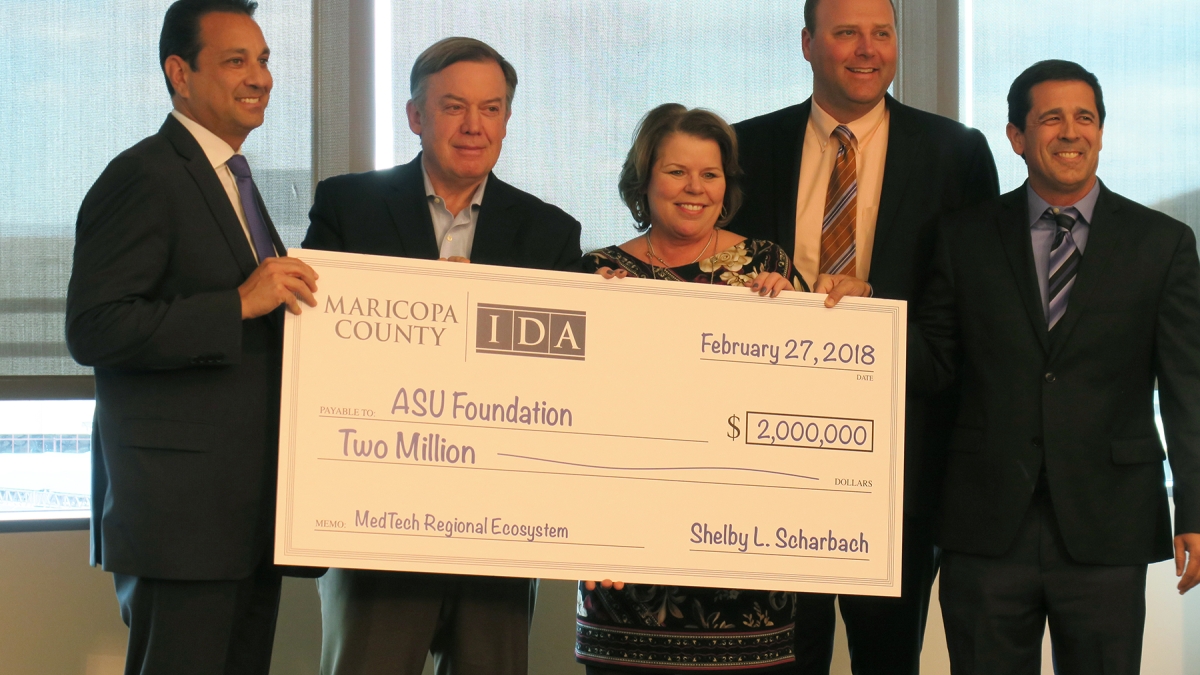ASU to lead MedTech workforce development with investment from Maricopa County Industrial Development Authority

From left: Maricopa County Board of Supervisors Chairman Steve Chucri, District 2, ASU President Michael Crow, MCIDA Executive Director Shelby L Scharbach, MCIDA Board Member Jeremy Stawiecki, and Maricopa County Industrial Development Authority Business Development Officer Gregg Ghelfi exchange an MCIDA check for $2 million to kick off a medical technology workforce development initiative.
Today the Arizona State University Foundation will accept a $2 million grant from the Maricopa County Industrial Development Authority (MCIDA) to fund a new workforce development project to accelerate innovation and entrepreneurship in Maricopa County. ASU’s Ira A. Fulton Schools of Engineering will lead the project to prepare existing, emerging and future members of Maricopa County’s workforce for jobs in the growing fields of medical electronic technology (MedTech) and additive manufacturing.
“This investment will help us bring together experts from academic, industrial and entrepreneurial settings to spur workforce development on a grand scale,” said Kyle Squires, dean of the Ira A. Fulton Schools of Engineering. “This cross-disciplinary training program shares the Fulton Schools’ expertise, infrastructure and resources while promoting economic growth in Maricopa County.”
The new workforce development program will prepare job seekers and displaced workers from microelectronics and other high-tech industries to excel in MedTech and additive manufacturing — both areas of expertise in the Fulton Schools.
Wearable electronics and handheld portable devices that provide on-demand diagnostic information for patients and their health-care providers represent only the beginning of what is possible using these technologies, and why it’s important to have a highly skilled workforce that can meet these growing demands.
“The medical technology industry is uniquely suited to grow here in Maricopa County, thanks to existing hospitals, industry pioneers such as MedTronic, and the minds of a world-class university in ASU,” said Steve Chucri, Maricopa County Board of Supervisors chairman, District 2. “This grant from the IDA is an example of a public-private partnership that can help grow and diversify our economy and bring jobs that improve the quality of life in Maricopa County.”
MedTech combines biotechnology, nano/micro-technology, information technology and cognitive sciences to deliver health-care solutions that have a profound positive impact on individual and public health. Additive manufacturing, the process by which many of these health-care solutions will come to life, is particularly useful for rapid prototyping and low-volume parts manufacturing.
Participants in the program will have access to a MedTech entrepreneurism course taught by ASU faculty and industry and entrepreneurial subject-matter experts; hands-on, high-tech training at ASU’s Flexible Electronics and Display Center; internships and apprenticeships at companies like Medtronic and Gore; and connections with MedTech startups. ASU will also work with the Maricopa County Community College District and other local educational institutions to develop training certification programs that meet industrial needs and improve the capacity of entrepreneurs and subject-matter experts to commercialize new MedTech products.
Several elements of the program will be available to participants starting summer 2018, with all program elements available in the fall. ASU is working with MCIDA to ensure that students, engagements and academic program cycles coordinate with the funding goals of the program.
“We want to fund programs and organizations that have a real shot at making a difference in people’s lives, whether that’s helping vulnerable populations or bringing high-tech, high-wage jobs to the region,” said Steven Bales Jr., president of MCIDA. “The MedTech program at ASU is a perfect fit with our mission, and we’re optimistic that our initial investment will help boost Maricopa County’s position as a leader and innovator in the field.”
MCIDA’s $2 million investment over a two-year period will jump-start the development of the program.
More Science and technology

Diagnosing data corruption
You are in your doctor’s office for your annual physical and you notice the change. This year, your doctor no longer has your…
Large-scale study reveals true impact of ASU VR lab on science education
Students at Arizona State University love the Dreamscape Learn virtual reality biology experiences, and the intense engagement it…

ASU-led space telescope is ready to fly
The Star Planet Activity Research CubeSat, or SPARCS, a small space telescope that will monitor the flares and sunspot activity…

